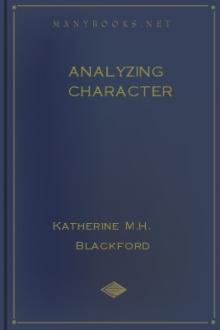Analyzing Character, Arthur Newcomb [popular romance novels .txt] 📗

- Author: Arthur Newcomb
- Performer: -
Book online «Analyzing Character, Arthur Newcomb [popular romance novels .txt] 📗». Author Arthur Newcomb
It is not to be wondered at that these boys and girls leave school, because in school they are compelled to sit quietly and to try to learn things in which they are not interested out of dry, unprofitable books. Such pupils need to spend a great part of their time out-of-doors. They can be thus taught far more easily, will take a greater interest in their studies, and can gain both knowledge and skill which will be more valuable to them in the world of work. They also need to be taught indoors manual training, domestic science, printing, laundry work, scientific horticulture, scientific agriculture, dairying, and many other such branches. The recently projected vocational schools, continuation schools, half-time schools, and other such contrivances for giving the boy or the girl an opportunity to learn a useful trade while he is mastering the three R's, are a very important and valuable step in the right direction; With an opportunity thus to find expression for his mechanical ability and his great activity, the boy will be encouraged to remain longer in school.
Those who have left school at an early age on account of restlessness should take very seriously to heart the fates of tens of thousands of men and women before them who have done the same thing and who have made a failure of their lives, because they did not have sufficient education and training with which to realize their aspirations.
THE IMPRACTICAL
It has been frequently remarked that this is a commercial age. Our great captains of industry, our multi-millionaires, have, most of them, made their fortunes in commerce. This is an age, perhaps—especially in the United States—which rather makes a hero of the business man. For this reason there are many who are ambitious for commercial success. Every year thousands upon thousands of young men and women leave school in order to enter business. By a very natural psychological paradox, there seems to be a fascination about commerce and finance for many young people who have little aptitude for these vocations. Many people, feeling their deficiencies, yearn to convince themselves and others that they are not deficient. It is only another phase of the fatality with which a Venus longs to be a Diana and a Minerva a Psyche. Thousands enter business who have no commercial or financial ability. They cannot know the requirements; they cannot understand the fundamental principles of business. Commercially they are babes in the woods. Therefore they go down to bankruptcy and insolvency, to their great detriment and to the injury of many thousands of others.
These young people are too impractical for business. They may have a theoretical understanding of it, and an intellectual desire to succeed. But, as a result of their impractical type of mind, they neglect details, they overlook important precautions, they are, oftentimes, too credulous, too easily influenced. They usually make poor financiers; they do not make collections well; they are incautious in extending credit and in maintaining their own credit; often they are inefficient and wasteful in management; they do not take proper account of all the costs in fixing prices; they enter into foolish contracts; make promises which they are unable to keep, and oftentimes, as a result of too great optimism, undertake far more than is commercially feasible.
HUNGRY FOR FAME
The same strange quirk in human nature which takes the impractical into the marts, takes many ambitious but inherently unfit into art and literature. The stage-struck girl who has not one scintilla of dramatic ability is so common as to be a joke—to all but herself and her friends. Every editor is wearied with his never-ending task of extinguishing lights which glow brightly with ambition but have no gleam of the divine fire. Teachers of art and music, both in this country and abroad, are threatened with insanity because of the hordes of young men and women who come to them with money in their hands, demanding to be made into famous artists and musicians, not having been born with genius. Some of these unfortunates spend years of time and thousands of dollars in money attempting to fit themselves for careers, only to end in utter failure. Some, even after they have made a comparative failure of their education, eke out a tortured existence, hoping against hope for the golden crown of fame and fortune.
In sober truth the fatal lack in most of these disappointed seekers is not that they have no talent, but that they are too lazy mentally to make a real success of the natural aptitudes they have. They lack "the infinite capacity for taking pains." They are deluded by the idea that success depends upon inspiration—that there is no perspiration. Yet every great writer, every great musician, every great actor, every great author, knows that there is no fame, there is no possibility of success, except through the most prolonged and painstaking drudgery.
"LIFE IS BRIEF—ART IS LONG"
Perhaps no actor of modern times had greater dramatic talents inborn than Richard Mansfield, yet here is the story of how Richard Mansfield[6] worked, toiled, starved and suffered in achieving success in his art:
His friends crowded St. George's Hall for his first appearance. It was observed, as he uttered the few lines of the Beadle, that he was excessively nervous. When, later in the evening, he sat down at the piano and struck a preliminary chord, he fainted dead away.
[6] From "Richard Mansfield," by Paul Wilstach. Charles Scribner's Sons, New York.
Mr. Reed relieved him of his position at once. In discharging him, he said: 'You are the most nervous man I have ever seen,' It was not all nervousness, however. Mansfield had not eaten for three days. He had fainted from hunger.
"Mansfield was now on evil days, indeed. He moved into obscure quarters and fought the hard fight. It was years before he would speak of these experiences. In fact, he rarely ruminated on the past in the confidences of either conversation or correspondence. Memory troubled him little and by the universal quotation it withheld its pleasures. He dwelt in the present, with his eyes and hopes on the future. It was always the future with him. No pleasure or attainment brought complete satisfaction. He looked to the past only in relation to the future; for experience, for example, for what to avoid.
"Once, when at the meridian of his fame, he was asked to lecture before the faculty and students of the University of Chicago. For his subject he chose, 'On Going on the Stage.' That he might exploit to those before him the reality of the actor's struggle, he lifted for the first time a corner of that veil of mystery which hung between his public and his past, and told of these early London days:
"For years I went home to my little room, if, fortunately, I had one,' he said, 'and perhaps a tallow dip was stuck in the neck of a bottle, and I was fortunate if I had something to cook for myself over a fire, if I had a fire. That was my life. When night came I wandered about the streets of London, and if I had a penny I invested it in a baked potato from the baked-potato man on the corner. I would put these hot potatoes in my pockets, and after I had warmed my hands, I would swallow the potato. That is the truth.'
"At length, his wardrobe became so reduced that attendance at any but the most informal entertainments became out of the question, and finally he had to give up these. Soon he was inking the seams of his coat, and wandered about shunning friends, for fear they would learn to what a condition he was reduced.
"'Often,' he admitted, 'I stayed in bed and slept because when I was awake I was hungry. Footsore, I would gaze into the windows of restaurants, bakeries, and fruit shops, thinking the food displayed in them the most tempting and beautiful sight in the world. There were times when I literally dined on sights and smells,'
"He did every species of dramatic and musical hack work in drawing rooms, in clubs, and in special performances in theatres. Sometimes he got into an obscure provincial company, but he said that his very cleverness was a kind of curse, since the harder he worked and the better the audiences liked him, the quicker he was discharged. The established favorites of these little companies always struck when a newcomer made a hit.
"Richard Barker was the stage manager and Mansfield could never please him. After trying again and again, he once cried: 'Please, Barker, do let me alone. I shall be all right. I have acted the part.' 'Not you,' declared Barker. 'Act? You act, man? You will never act as long as you live!'
"The recollection of the rebuffs, poverty, starvation, inability to find sympathy, because, possibly, of the pride which repelled it, the ill-fortune which snatched the extended opportunity just as he was about to grasp it, the jealousy of established favorites of the encroaching popularity of newcomers, the hardships of provincial travel and life in a part of the country and at a time when the play-actor was still regarded as a kind of vagabond and was paid as such, the severity of the discipline he encountered from the despots over him—all painted pictures on his memory and fed a fire under the furnace of his nature which tempered the steel in his composition to inflexibility. The stern rod of discipline was held over him every moment and often fell with unforgetable severity. He was trained by autocrats in a school of experience more autocratic than anything known to the younger actors of this generation.
"When the part of Chevrial was given to him, Mansfield was fascinated with his opportunity, but he kept his counsel. He applied every resource of his ability to the composition of his performance of the decrepit old rake. He sought specialists on the infirmities of roués; he studied specimens in clubs, on the avenue, and in hospitals; and in the privacy of his own room he practiced make-ups for the part every spare moment. The rehearsals themselves were sufficiently uneventful. He gave evidence of a careful, workmanlike performance, but promise of nothing more.
"While he was working out the part Mansfield scarcely ate or slept. He had a habit of dining with a group of young Bohemians at a table d'hôte in Sixth Avenue. The means of none of them made regularity at these forty-cent banquets possible, so his absence was meaningless. One evening, however, he dropped into his accustomed chair, but tasted nothing.
"'What's the matter, Mansfield?' asked one of the others.
"To-morrow night I shall be famous,' he said. 'Come and see the play,'
"His friends were accustomed to lofty talk from him. His prophecy was answered with a light laugh and it had passed out of their memories as they drifted into the night. This was one of those intuitions to which he often confessed, and it told him that the years of apprenticeship were behind him and the artist in him was on the eve of acknowledgment.
"On the night of January 11, 1883, the theatre was radiant with an expectant audience—half convinced in advance by the record of the Union Square's past, but by the same token exacting to a merciless degree—to see their old friends in the first performance in America of 'A Parisian Romance.'
"Mansfield made his entrance as the Baron Chevrial within a few moments after the rise of the curtain. It was effected in an unconcerned silence on the part of the audience.
"There





Comments (0)